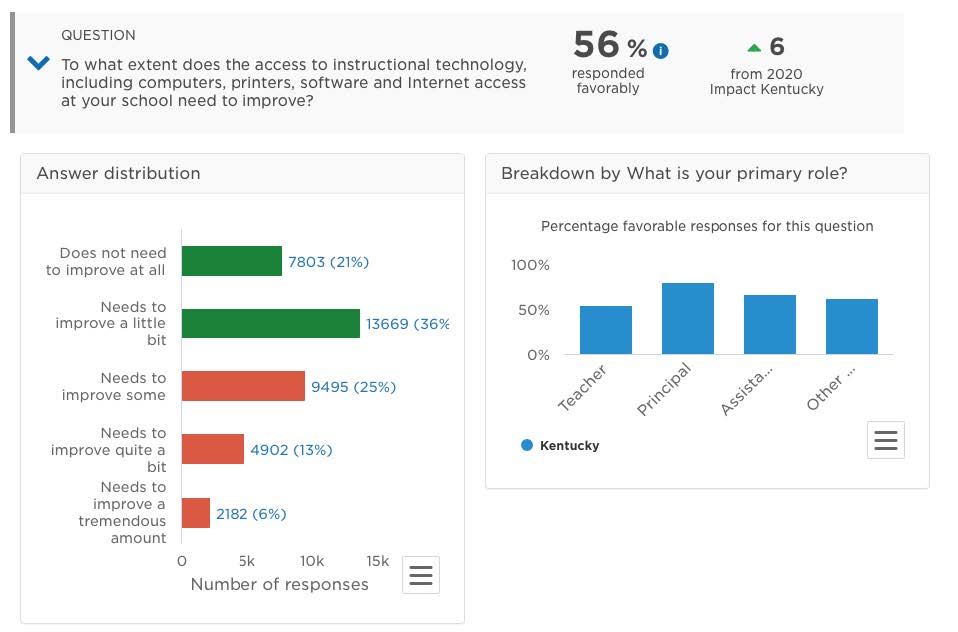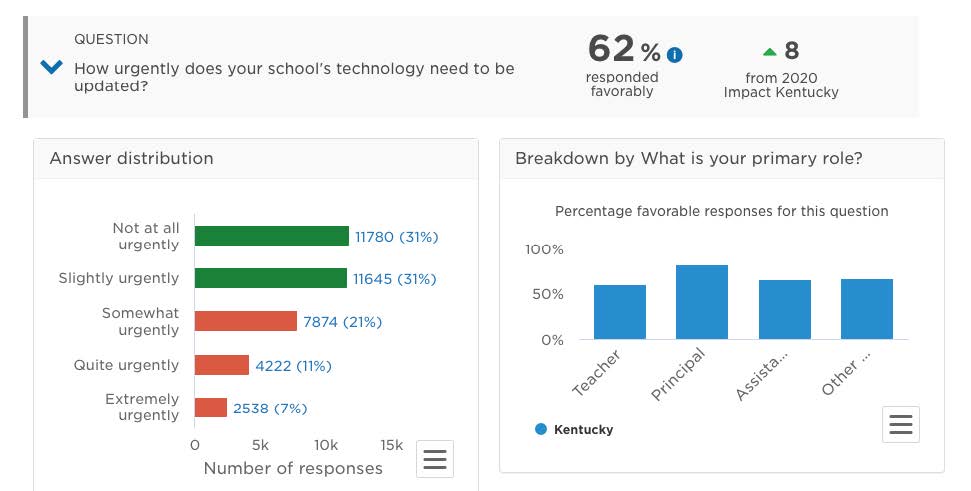Appendix A - Studies and Research
Studies and initiatives at national and local levels have been conducted that are integral to education technology in Kentucky. Several studies yield recommendations that directly impact the strategic direction of the Kentucky Education Technology System. This section contains a brief summary of each related connection with a link to the full study and publication. These connections collectively drive our efforts on a daily basis.
Kentucky Studies
 Kentucky K-12 Data Quality Study (revised July 2016) - The Kentucky Department of Education completed the most comprehensive study on K-12 data governance, data quality, and data stewardship in U.S. history in 2014. The study identified 10 major findings and produced recommendations that greatly impact data quality work in KDE and Kentucky K-12 school districts.
Kentucky K-12 Data Quality Study (revised July 2016) - The Kentucky Department of Education completed the most comprehensive study on K-12 data governance, data quality, and data stewardship in U.S. history in 2014. The study identified 10 major findings and produced recommendations that greatly impact data quality work in KDE and Kentucky K-12 school districts.

The People Side of K-12 EdTech (A Human Capital Call to Action) - An important element in the success of any Education Technology (EdTech) program or initiative is the people that help to establish and support digital access for students, teachers, and staff. As access to digital content and resources brings expectations of reliability, flexibility, security, and affordability, the responsibilities placed upon our instructional and operational technology staff to ensure that the experience for all shareholders is positive and supports the mission and culture of the local district continue to grow. Across the nation, including Kentucky, the demand for access to digital content and subsequent growth in technology investments continue to outpace the growth rate of the human capital or staffing required. Kentucky Department of Education's (KDE) annual Digital Readiness survey continues to track and forecast an ever-growing deficit in what we describe as the "Human Capital" element of the success equation. KDE partnered with BrightBytes to create this study to help highlight the current landscape and identify best practice guidance as opposed to a requirement.

AI Guidance Brief - As an Area of Emphasis in our KETS Master Plan, emerging technologies - like AI, are often met with a mix of excitement and apprehension, especially in K-12 education. While the potential of AI in the K-12 education field is undeniable, treating it differently than other emerging technologies can hinder its effective integration and create unnecessary anxieties. Approaching AI through the same lens used for other innovations is crucial and this guidance brief (and study) provides a foundation for implementations in Kentucky K-12 public schools.
Additional AI Information:
AI in Kentucky Education - Kentucky Department of Education

Broadband in Kentucky - Conducted by the Legislative Research Commission, the report reviews broadband development in Kentucky, with emphasis given to legislative and agency-driven efforts to assess, plan, and fund last-mile broadband deployment. The resulting report provides perspective on both the history and current landscape of broadband technology, infrastructure, funding, availability, and adoption in Kentucky. It also highlights some of the most significant challenges facing state broadband development and recommended solutions.

Comprehensive K-12 Computer Science Plan - The state's first comprehensive plan to address the growing educational needs of Kentucky students demanded by a 21st Century workforce. The plan's primary focus is the alignment of resources to increase access to computer science learning for all K-12 students.

Annual Comprehensive K-12 Computer Science Reports - This legislatively mandated report (SB 193, 2020) provides enrollment numbers, demographics of computer science learners, and the status of teacher computer science certifications in Kentucky's public schools.

Dataseam Audit Report - The Finance and Administration Cabinet's Office of Policy and Audit completed an audit of the Kentucky Dataseam Initiative with submission of this report on August 14, 2020. The general objective of the audit was to determine the costs and benefits of the contractual arrangement by which Apple computers are provided to Kentucky school districts in exchange for the use of available computer processing power for cancer and other research. The timeframe for OPA's audit work and analysis was from FY 2007 through FY 2020.

Data Security, Breach, and Privacy Best Practice - Originating in 2006 from House Bill 341 and updated in 2015 to meet House Bill 5 provisions, this document provides guidelines and recommendations to KDE, school districts, and vendors concerning basic measures to protect and prevent the access of restricted personal information by any person who does not have the proper access rights, authority or the "need to know." It also provides considerations and protocols for notifying any affected individual.
 Digital Learning 2020 - 2011, OpenEd Solutions presented to the Kentucky Board of Education (KBE) a report titled Digital Learning 2020 that outlined 11 recommendations related to various aspects of digital learning. Closely aligned with Breaking New Ground: The Final Report of the Governor's Task Force on Transforming Education in Kentucky (BNG) and considering the 10 Elements of the Digital Learning Now report (DLN), the following recommendations build on the interviews, summit discussions, and the strengths and weaknesses:
Digital Learning 2020 - 2011, OpenEd Solutions presented to the Kentucky Board of Education (KBE) a report titled Digital Learning 2020 that outlined 11 recommendations related to various aspects of digital learning. Closely aligned with Breaking New Ground: The Final Report of the Governor's Task Force on Transforming Education in Kentucky (BNG) and considering the 10 Elements of the Digital Learning Now report (DLN), the following recommendations build on the interviews, summit discussions, and the strengths and weaknesses:
-
All students should be eligible for digital learning. Eligibility for full and part-time learning options is key to a number of BNG recommendations including advanced courses, world languages, special needs, credit recovery, and dual credit.
-
Authorize multiple statewide online learning providers to expand full and part-time options – Like recommendation #1, a multiple providers environment fulfills the BNG vision.
-
Allow students to personalize their learning
-
Support customized learning pilots
-
Support competency-based learning pilots
-
Plan for a shift to online instructional materials by 2013-14
-
Support the shift to blended instruction Assessment and Accountability (DLN 8, BNG 8)
-
Plan for online assessment by 2013-14
-
Create a statewide online/blended learning authorizer/contractor
-
Develop a fractional and performance-based funding model
-
Create a program management office and fund the transition

Kentucky Digital Learning Guidelines - A shift to online textbooks, digital instructional materials, and online/virtual courses in Kentucky schools prompted the Kentucky Department of Education Digital Learning Team, along with many shareholders, to design the Kentucky Digital Learning Guidelines as guidance for schools, districts, and digital providers when selecting or creating developmentally appropriate digital learning resources for instruction. The Kentucky Digital Learning Guidelines highlight five ready-to-implement guiding principles.

IT Assessment and Optimization Gartner Study - Performed in 2004, this study detailed key findings as well as provided implementation recommendations to KDE to increase cost efficiency and enhance the effectiveness of IT services and investments. Recommendations from this study are evident in the foundations of many current OET processes and initiatives.

Kentucky Impact Survey - Kentucky teachers must have confidence in education technologies to continue to design and implement digitally enhanced learning experiences. In 2022, Kentucky teachers reported (Impact, 2022) continued growth in confidence as 62% and 56% responded favorably to the current state of school technology resources, including computers, software, and internet access. This confidence drives usage and adoption. Kentucky teachers participate in the Impact working conditions survey every other school year. The most recent survey helps ensure we are supporting our teachers and providing them with opportunities to thrive digitally. Teaching conditions relate to student learning conditions as well as opportunities for digital learning experiences. When our teachers succeed digitally, Kentucky's children succeed. Specifically in the Kentucky Impact Survey, there are intentional and connected questions that inform the KETS Master Plan. The following visual identifies key questions and corresponding teacher agreement percentages.


 Kentucky Broadband Task Force Report - Created in 2004, the KBTF charge was to examine expanding broadband service in Kentucky and report findings to the governor and Legislative Research Commission. A key recommendation was the creation of the Kentucky Education Network.
Kentucky Broadband Task Force Report - Created in 2004, the KBTF charge was to examine expanding broadband service in Kentucky and report findings to the governor and Legislative Research Commission. A key recommendation was the creation of the Kentucky Education Network.
 Office of Education Accountability Study of Educational Technology Initiatives - This 2009 publication is the result of the Office of Education Accountability's (OEA) review of Kentucky's education technology, inclusive of funding, governance, and status of related initiatives and projects. The study names several accomplishments as well as some areas in need of improvement.
Office of Education Accountability Study of Educational Technology Initiatives - This 2009 publication is the result of the Office of Education Accountability's (OEA) review of Kentucky's education technology, inclusive of funding, governance, and status of related initiatives and projects. The study names several accomplishments as well as some areas in need of improvement.

Security and Privacy Best Practice - Created in 2010, the Office of Educational Technology established standard security guidelines for Kentucky's 173 K-12 districts to ensure the availability, integrity, and confidentiality of information required for normal education operations.

KSBA Review of Cloud-Based Technologies and Student Data Privacy - Authored in 2014, the Kentucky School Board Association worked with KDE while taking an interest in cloud-based technologies and services where data may be accessed from almost anywhere if a person has a Web-capable device and Internet access.

Statewide System of Support (SSoS) - This study summarizes perceptions of the KDE Self-Assessment Team and additional KDE staff about strengths and areas of need in Kentucky's SSoS as well as major themes that emerged during the two-month self-assessment process.

Task Force on Student Access to Technology - The Task Force on Student Access to Technology was established by the 2012 General Assembly with the enactment of Senate Bill 95. The task force was charged with considering strategies for providing fifth and sixth-grade students with access to computing devices for school and home use and reviewing the statewide availability of broadband technology necessary for using the devices. To achieve the goals of the task force, the members chose to examine what Kentucky schools are already doing in the area of mobile computing devices, national trends, digital curriculum, and access to broadband.

Governance of Education Data Security in Kentucky - In December 2012, the Education Assessment and Accountability Review Subcommittee approved a research agenda for the Office of Education Accountability that included a review of the security of Kentucky's education information systems. The review discovered many best practices were in place but made recommendations in six key disciplines to ensure district-level security plans are created, implemented, audited, and enforced.

Office of Education Accountability Study of Textbooks and Instructional Materials (Instructional Resources Study) – This 2018 research report is the result of the Office of Education Accountability (OEA) study of the laws governing the adoption and purchasing processes for instructional materials for public schools in the commonwealth, a breakdown of instructional materials purchases across the state over a 10 year period, and highlights the shifting landscape of instructional materials from primarily print sources to technology-related sources. The study resulted in four major findings and also provides an overview of education technology resources in Kentucky school districts, primarily using technology information from the Kentucky Technology Readiness Survey.

Auditor of Public Accounts (APA) Examination of the Kentucky Communications Network Authority (KCNA) - The APA initiated a special examination of the KCNA in December 2017. The focus of the examination was to evaluate contracts, procurement, financing structure, and other areas of concern related to KCNA and the KentuckyWired project. The conclusions, detailed findings and recommendations, and opinions expressed in this examination report are those of the APA as provided for in KRS 43.050. This report was presented and delivered by the APA to the Program Review and Investigations Committee on June 14, 2018.

Program Review and Investigations Committee KentuckyWired Investigation Status Report - During their June 7, 2019, meeting, the Legislation Research Commission's Program Review and Investigations Committee brought forth a status report/update to the KentuckyWired Investigation. This was a follow-up and continuation of the Auditor of Public Accounts report completed and presented to this committee during their October 2018 meeting. The report outlines conclusions that Program Review staff view as the most significant along with the detailed findings that support these conclusions.
External Studies
This section consists of studies created by external entities, which have proven to play a role in developing KETS Master Plan strategies.
 The Technology Factor: Nine Keys to Student Achievement and Effectiveness - Project RED, the group responsible for this study, seeks to understand and define the specific implementation strategies that are successfully transforming schools with technology. Project RED has identified nine key implementation factors that are linked most strongly to the education success measures.
The Technology Factor: Nine Keys to Student Achievement and Effectiveness - Project RED, the group responsible for this study, seeks to understand and define the specific implementation strategies that are successfully transforming schools with technology. Project RED has identified nine key implementation factors that are linked most strongly to the education success measures.

The New 3 E's of Education: Enabled, Engaged and Empowered - Released in 2011 by Project Tomorrow, this report utilizes data findings from the Speak Up national survey to determine how students are using emerging technologies to learn. The three key trends of mobile learning, blended learning and e-textbooks directly address the vision of students that are enabled, engaged, and empowered to learn.

Project Tomorrow: Building Teacher Capacity and Competency to Create Learning Experiences for Students - A report released by Project Tomorrow and Blackboard using the Speak Up initiative fall 2016 survey utilizes data points to examine the readiness of teachers to use digital tools to transform the learning process. Additional annual Speak Up data findings and reports continue to be relevant to the Master Plan.
 Building Technology Infrastructure for Learning - In June 2017, the U.S. Department of Educational Office of Educational Technology released a comprehensive look at delivering broadband connectivity to schools for the purpose of student learning. The guide provides examples of how to connect a school district to broadband, connect students and staff inside the school building, roll out devices to staff and students, as well as responsible use and privacy considerations.
Building Technology Infrastructure for Learning - In June 2017, the U.S. Department of Educational Office of Educational Technology released a comprehensive look at delivering broadband connectivity to schools for the purpose of student learning. The guide provides examples of how to connect a school district to broadband, connect students and staff inside the school building, roll out devices to staff and students, as well as responsible use and privacy considerations.
 Kentucky Schools Launch Statewide Cloud-based Financial Management System - A two-year project completed in 2013 made Kentucky the largest school system in the United States utilizing a cloud-based financial system. The move provided districts with more reliable access to MUNIS services, significant cost savings, and disaster recovery capability that could not be achieved with a traditional on-premise solution.
Kentucky Schools Launch Statewide Cloud-based Financial Management System - A two-year project completed in 2013 made Kentucky the largest school system in the United States utilizing a cloud-based financial system. The move provided districts with more reliable access to MUNIS services, significant cost savings, and disaster recovery capability that could not be achieved with a traditional on-premise solution.
 2019 Education Superhighway (ESH) Kentucky Connectivity Snapshot - The ESH report tracks progress toward the K-12 connectivity goals established by the Federal Communications Commission (FCC). The report, published annually, highlights national and state progress toward achieving connectivity goals and the key requirements for meeting future connectivity needs: access to fiber or equivalent high-speed infrastructure, sufficient Wi-Fi equipment in classrooms to support 1:1 digital learning and affordable pricing.
2019 Education Superhighway (ESH) Kentucky Connectivity Snapshot - The ESH report tracks progress toward the K-12 connectivity goals established by the Federal Communications Commission (FCC). The report, published annually, highlights national and state progress toward achieving connectivity goals and the key requirements for meeting future connectivity needs: access to fiber or equivalent high-speed infrastructure, sufficient Wi-Fi equipment in classrooms to support 1:1 digital learning and affordable pricing.
 CoSN EdTech Trends and Funding - EdTech Trends and Funding: A CoSN Member Survey 2022, summarizes the responses of CoSN members to a short survey on edtech trends and funding, first conducted in 2020 to gauge the impact of the Covid-19 crisis.
CoSN EdTech Trends and Funding - EdTech Trends and Funding: A CoSN Member Survey 2022, summarizes the responses of CoSN members to a short survey on edtech trends and funding, first conducted in 2020 to gauge the impact of the Covid-19 crisis.
 Artificial Intelligence and the Future of Teaching and Learning - This 2023 policy report by the U.S. Department of Educational Office of Educational Technology provides insights and recommendations for the use of artificial intelligence (AI) in education.
Artificial Intelligence and the Future of Teaching and Learning - This 2023 policy report by the U.S. Department of Educational Office of Educational Technology provides insights and recommendations for the use of artificial intelligence (AI) in education.
 Advancing Digital Equity for All - Developed using the insights gathered from community-based organizational leaders and families during the Digital Equity Education Roundtables (DEER) Initiative hosted by the U.S. Department of Education's Office of Educational Technology in 2022, this guidance resource encourages leaders to create digital equity plans outlining strategies for increasing access to technology for learning and closing the digital divide.
Advancing Digital Equity for All - Developed using the insights gathered from community-based organizational leaders and families during the Digital Equity Education Roundtables (DEER) Initiative hosted by the U.S. Department of Education's Office of Educational Technology in 2022, this guidance resource encourages leaders to create digital equity plans outlining strategies for increasing access to technology for learning and closing the digital divide.
 Forum Guide to Digital Equity - A 2022 resource published by the National Forum on Education Statistics seeks to assist federal, state, and local education leaders' understanding of digital equity and how it can be achieved through the collection of high-quality, comparable digital equity data.
Forum Guide to Digital Equity - A 2022 resource published by the National Forum on Education Statistics seeks to assist federal, state, and local education leaders' understanding of digital equity and how it can be achieved through the collection of high-quality, comparable digital equity data.

Education Superhighway's Affordable Connectivity Program (ACP) Report and Toolkit - EducationSuperHighway's Affordable Connectivity Program Toolkit for local and school district leaders contains a step-by-step action plan, information on our enrollment assistance tool, and a resource hub with templates and customizable resources. The materials and data dashboards are designed for school districts of all sizes and provide lessons learned and best practices to make your efforts as impactful as possible.

State EdTech Trends Survey - The 2022 State EdTech Trends survey and report is the first attempt to track how state education agencies and policymakers are adapting to a digital world post-pandemic while also identifying state priorities relating to technology and education. KETS continues to leverage national EdTech trends to further align and gauge priorities.
 The 2024 State EdTech Trends survey and report provides insights on the top edtech priorities as identified through SETDA's survey of state policymakers. This year's survey collected information from state leaders in 46 states. The report complements the insights from the survey data with spotlights that showcase the important work of state leaders in Indiana, Kentucky, Maine, Virginia, and Washington. Technology leaders from these states are developing tools to advance the responsible and safe use of AI in K-12 classrooms, collaborating with state and district leaders to support cybersecurity in schools, and supporting the effective and equitable use of edtech tools.
The 2024 State EdTech Trends survey and report provides insights on the top edtech priorities as identified through SETDA's survey of state policymakers. This year's survey collected information from state leaders in 46 states. The report complements the insights from the survey data with spotlights that showcase the important work of state leaders in Indiana, Kentucky, Maine, Virginia, and Washington. Technology leaders from these states are developing tools to advance the responsible and safe use of AI in K-12 classrooms, collaborating with state and district leaders to support cybersecurity in schools, and supporting the effective and equitable use of edtech tools.

How States Measure Digital Equity (SETDA) - From December 2020 through January 2021, SETDA and Dell Technologies (along with partnership work from the Council of Chief State School Officers - CCSSO) researched and published a report to better understand the data that states have captured related to digital equity. Thirty-four (34) states and the territory of Guam responded. Questions on the survey focused on data collected during the 2020 – 21 school year by state education agencies (SEAs). Kentucky is highlighted as a model for “How States Measure Digital Equity" with current and proposed benchmarks.